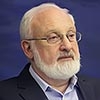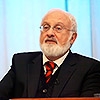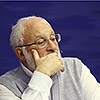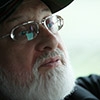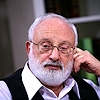The Desire to Know the Meaning of Life
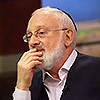 Question: What initially guided you in life?
Question: What initially guided you in life?
Answer: Like everyone else, I was driven by the desire to understand the meaning of life, its mysteries, because I saw that everything must have some form of control. Not a single cell, organism, or the entire universe, if it is an interconnected system, can exist without being controlled, according to what our sciences say.
But they only reveal a small part of the nature surrounding us. We scrape off some specks of dust and call it “chewing on the granite of science.” Indeed, before us stands an enormous granite wall, and where we can chip off a piece, that is our science, and everything else is the unknown.
That is how I clearly felt standing before this “granite wall,” which I could scrape slightly to collect a bit just like everyone else.
Newton had a different analogy. He is quoted as likening himself to a “schoolboy collecting pebbles on the shore of the sea called knowledge.” And he is only collecting pebbles, not even in the sea yet, but on the shore.
When I felt this, science stopped attracting me. It seemed so petty and insignificant to me that it was not worth dedicating my entire life, being devoted to it, for the sake of some small, isolated pieces of knowledge. However, that does not mean I disregarded it. Not at all! I still love it, read about it, and stay interested, all these years.
Nevertheless, I was strongly repelled by it. What is the point of scratching the “granite” like everyone else to pick up a couple of crumbs, understand a bit more, and know a bit more? If I were to engage only in my biocybernetics, I would not even understand or recognize it.
And what about biology, zoology, botany, geology, mineralogy, earth science, and cosmology? A vast array of other sciences in principle speak about all of nature, about all this “granite.” But each one scrapes and collects different “specks” from different places, and from this arises geology, zoology, mineralogy, and so on. What would I gain from engaging in them?
When I looked at this, I felt immense emptiness within me: There is nothing worth living for. I was left with only one question: How can I find the meaning of life? What interested me was not the trivial knowledge of partial, scattered, disconnected sciences, each of which scraped together something for itself, but the overall understanding—the design of the Universe.
This is what is called the “meaning of life” because human life, as we observe, is the highest form of existence. What is the purpose for nature, the upper force, (call it the Creator, emanator, or maker, it does not matter) to create all this?
This greatly puzzled me. My whole life until I found Kabbalah turned into some sort of emptiness. I worked, served, opened my own fairly successful business, but all of that was somehow in the background. Inside I felt absolute emptiness and the insignificance of existence. That’s how it was.
I think today millions, maybe even billions, of people in the world feel the same way. This feeling precedes a person’s search and helps them feel the system in which we exist. Basically I used to ask myself: “What is this? Why is all this around me, including myself?”
When you look at the starry sky and see this infinity, you think and wonder how to understand and comprehend all this?
For what? Why? What? There is such a question that comes from the Universe itself when you look at it on a dark night. If this question truly torments a person, they come to study Kabbalah.
For those people who simply feel a crisis, somehow, they need to understand the system they are in. After all, if they do not balance themselves with this system of nature, do not bring themselves to homeostasis, to harmony, then nature will crush them with its catastrophes: tsunamis, earthquakes, shifts in tectonic plates, and even nuclear war.
Then there are only two options: either they start seeking the meaning of life out of animal fear, or they die out like dinosaurs who disappeared because they did not fit the changing system of nature.
But dinosaurs did not have another solution. We have a very simple solution: either we change, or we perish. A small part will remain that will still come to balance with nature. According to the wisdom of Kabbalah, it may happen like this.
Moreover, only those who can participate in integration will remain. They will create balance. All the others will be in this system but not in the earthly form because their current animalistic egoism will not allow them to participate in integration.
However, there is an easy way when people, through education and explanatory work, each one and all together helping each other, come to integration between themselves, become similar to nature, enter into balance and harmony with it, and feel all its perfection.
I really hope for such an outcome.
[326178]
From KabTV’s “I Got a Call. The Meaning of Laitman’s Life “1/4/12
Related Material:
Where Will the River of Life Take Us?
The Meaning Of Life Is Here And Now
Paths To The Question Of The Meaning Of Life



